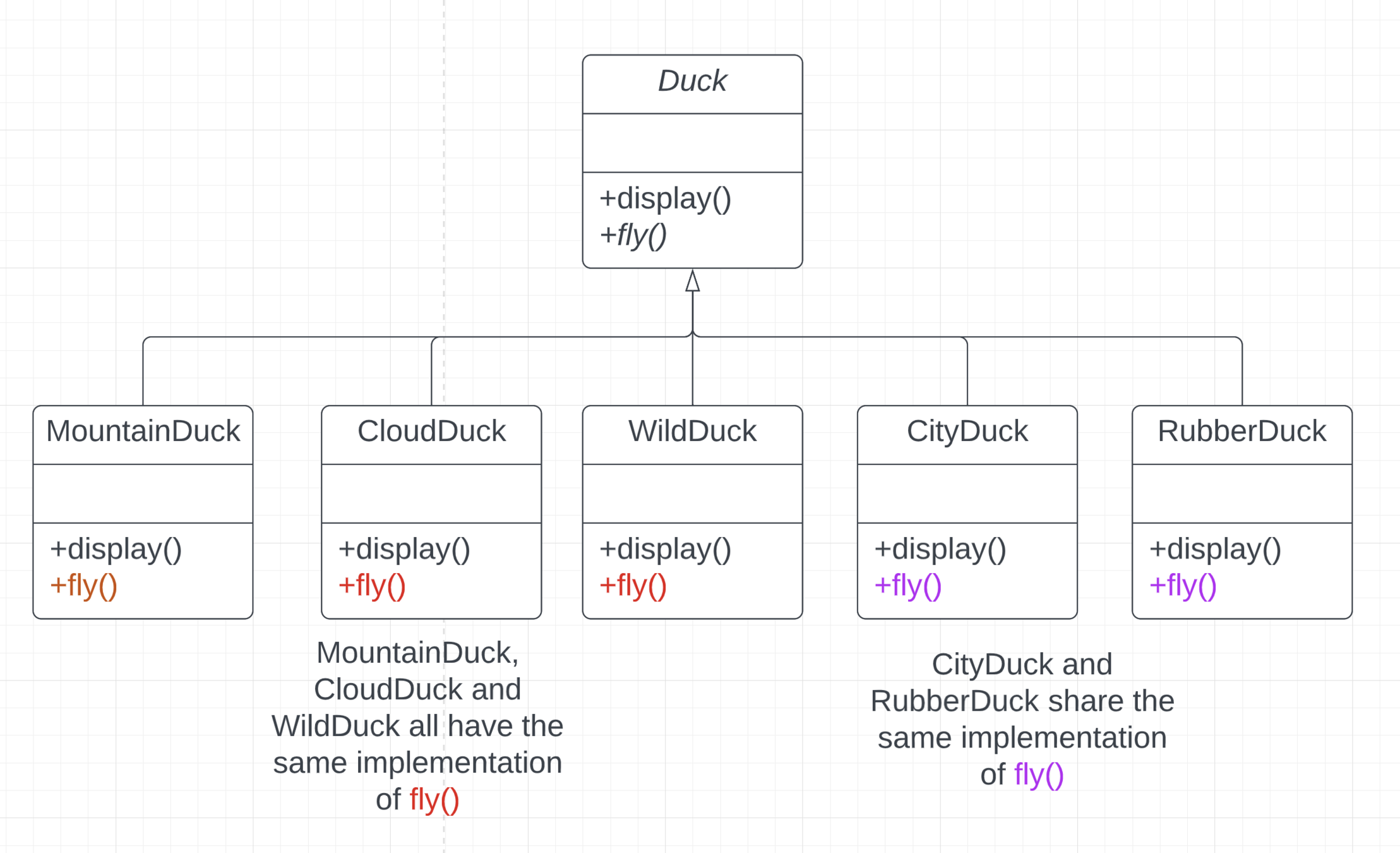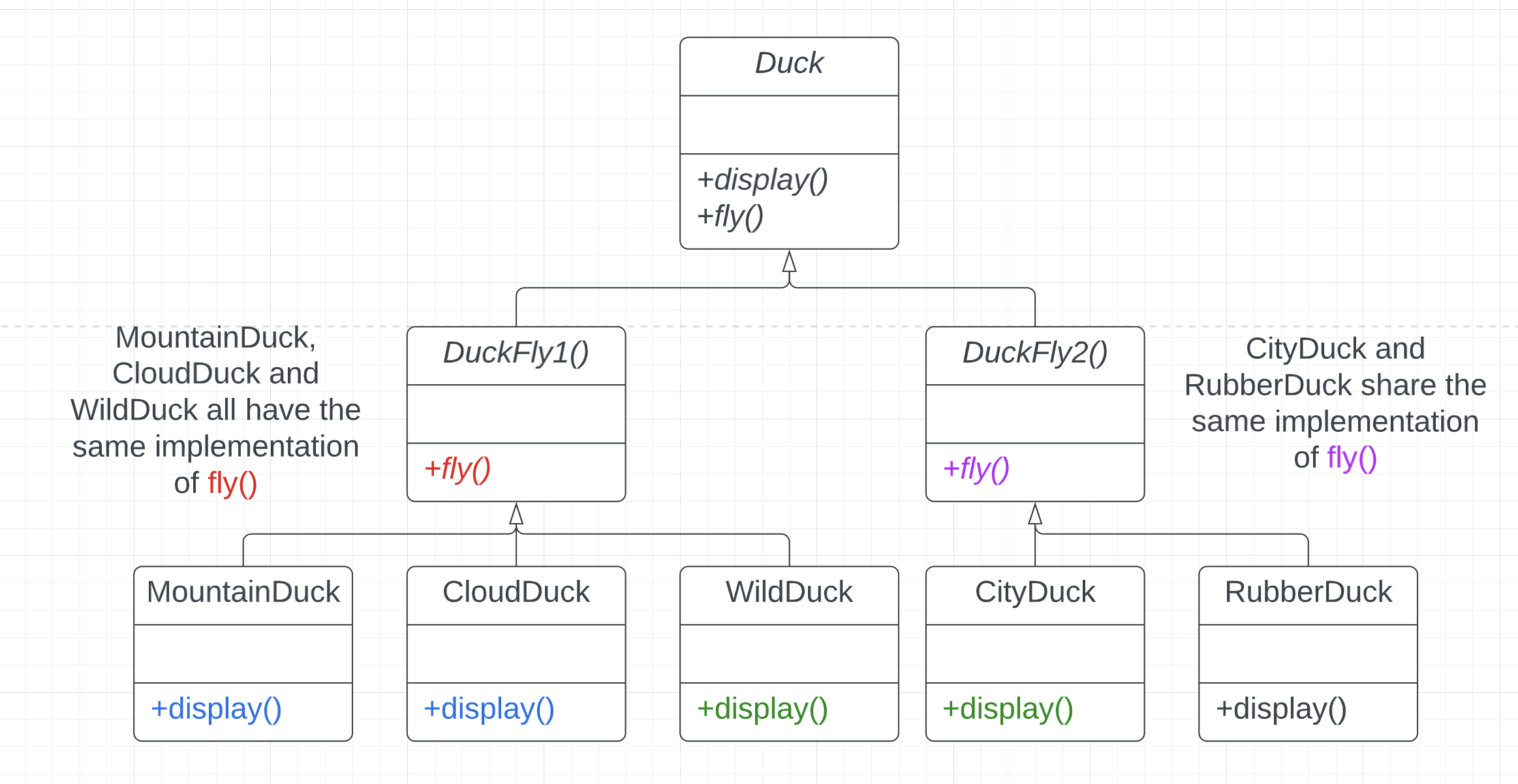COMP2511
24T1 Week 5
Tuesday 6PM - 9PM (T18A)
Slides by Alvin Cherk (z5311001)
This week
- Assignment-i Tips (again)
- Strategy pattern
- Observer pattern
- State Pattern
Please make sure your lab marks are up to date and what you expect.
Assignment Tips
Use .equal() for String (or any Class) comparison instead of ==
public class EqualsExample {
public static void main(String[] args) {
String s1 = "Hello"; // string literal
String s2 = new String("Hello"); // string class
System.out.println(s1 == s2); // false, as its comparing the addresses of s1 and s2
System.out.println(s1.equals(s2)); // true, compares the values at the addresses
// ^ do this
}
}Correctness + style issue
Assignment Tips
Avoid the use of magic numbers, assign them to final variables (readability - style issue)
public class MagicNumbers {
List<String> files = new ArrayList<>();
public void doSomething() {
if (files.size() == 5) { // 5 here is a magic number
// What does it mean?
}
}
}
public class MagicNumbers {
List<String> files = new ArrayList<>();
private final static int MAX_FILES = 5;
// declare constant with good name ^
public void doSomething() {
if (files.size() == MagicNumbers.MAX_FILES) {};
double angle = 750; // ^ use constant here
angle = angle % 360; // This is more OK, since theres context
}
}
Assignment Tips
Don't use super.x to set attributes in the super class in the subclass's constructor. Pass variable into super constructor as argument (single responsibility - design issue)
// Example: What not to do
public class Shape {
private String name;
private double length;
public Shape(String name) {
this.name = name;
// length is currently unset
}
public void setLength(double length) {
this.length = length;
}
}
public class Rectangle extends Shape {
public Rectangle(String name, double length) {
super(name);
this.length(length); // bad
this.length = length; // also bad if not private
}
}Assignment Tips
Don't use super.x to set attributes in the super class in the subclass's constructor. Pass variable into super constructor as argument (single responsibility - design issue)
// Example: What to do
public class Shape {
private String name;
private double length;
public Shape(String name, double length) {
this.name = name;
this.length = length;
this.setLength(length); // this is ok as well
}
}
public class Rectangle extends Shape {
private String somethingElse;
public Rectangle(String name, double length, String somethingElse) {
super(name, length);
this.somethingElse = somethingElse;
}
}Assignment Tips
Use instanceof for type comparison (open/close - design issue)
public abstract class Shape {
public abstract String getType();
}
public class Rectangle extends Shape {
public void doSomething(List<Shape> shapes) {
for (Shape s : shapes) {
if (s.getClass().equals(Rectangle.class)) { // v1: kinda ok
// do something only on exactly the Rectangle class
}
if (s.getType().equals("Rectangle")) { // v2: very bad
// do something on all rectangles
}
if (s instanceof Rectangle) { // v3: good
// do something on all rectangles
}
}
}
}
public class Square extends Rectangle {}Assignment Tips
Polymorphism is preferred over typechecking to perform a specific action (open/closed - design issue explored next week)
// Example: What not to do
public abstract class Shape {
public abstract String getType();
}
public class Rectangle extends Shape {}
public class Square extends Rectangle {
public static void main(String[] args) {
List<Shape> shapes = new ArrayList<>();
shapes.add(new Rectangle());
shapes.add(new Square());
for (Shape s : shapes) {
if (s.getType().equals("Rectangle")) {
// calculate the area this way
} else if (s.getType().equals("Square")) {
// calculate the area a different way
}
}
}
}Assignment Tips
Polymorphism is preferred over typechecking to perform a specific action (open closed - design issue explored next week)
// Example: What to do
public abstract class Shape {
public abstract String getType();
public abstract double area();
// ^ declare method in superclass
}
public class Rectangle extends Shape {
public double area() {
// calculate the area this way
}
}
public class Square extends Rectangle {
public double area() {
// calculate the area a different way
}
public static void main(String[] args) {
List<Shape> shapes = new ArrayList<>();
shapes.add(new Rectangle());
shapes.add(new Square());
for (Shape s : shapes) {
s.area(); // no more type checking
}
}
}Strategy Pattern
Strategy Pattern
Problem: Only some of the children of a parent class implement an abstract method the same way.
Question: How would you implement this without duplicating code?
Note: Behaviours are only shared downwards in inheritance

Strategy Pattern
Problem: Only some of the children of a parent class implement an abstract method the same way.
We could introduce a new class in-between the parent and child class.

Strategy Pattern
We could introduce a new class in-between the parent and child class.
However, this becomes problematic when we the Ducks have other methods that share the same implementation.

Strategy Pattern
A solution is to move this behaviour into another class and compose this class inside Duck

This is one of the main benefits of the strategy pattern, sharing behaviour across an inheritance tree
Strategy Pattern
What type of design pattern is strategy?
Behavioural Pattern
Behavioural patterns are patterns concerned with algorithms and the assignment of responsibility between object
- Uses composition instead of inheritance
- Allows for dependency injection (Selects and adapts an algorithm at run time). Change the behaviour at runtime.
- Encapsulates interchangeable behaviours and uses delegation to decide which one to use
- Useful when you want to share behaviour across an inheritance tree
Strategy Pattern

Code Demo
Strategy Pattern
Restaurant payment system with the following requirements:
- The restaurant has a menu, stored in a JSON file. Each meal on the menu has a name and price
- The system displays all of the standard meal names and their prices to the user so they can make their order
- The user can enter their order as a series of meals, and the system returns their cost
- The prices on meals often vary in different circumstances. The restaurant has four different price settings:
-
Standard - normal rates
- Holiday - 15% surcharge on all items for all customers
- Happy Hour - where registered members get a 40% discount, while standard customers get 30%
- Discount - where registered members get a 15% discount and standard customers pay normal prices
The prices displayed on the menu are the ones for standard customers in all settings
public class Restaurant {
...
public double cost(List<Meal> order, String payee) {
switch (chargingStrategy) {
case "standard":
return order.stream().mapToDouble(meal -> meal.getCost()).sum();
case "holiday":
return order.stream().mapToDouble(meal -> meal.getCost() * 1.15).sum();
case "happyHour":
if (members.contains(payee)) {
return order.stream().mapToDouble(meal -> meal.getCost() * 0.6).sum();
} else {
return order.stream().mapToDouble(meal -> meal.getCost() * 0.7).sum();
}
case "discount":
if (members.contains(payee)) {
return order.stream().mapToDouble(meal -> meal.getCost() * 0.85).sum();
} else {
return order.stream().mapToDouble(meal -> meal.getCost()).sum();
}
default:
return 0;
}
}
...
}- How does the code violate the open/closed principle?
- How does this make the code brittle?
Not closed for modification, open for extension. If more cases need to be added, the switch statement has to be changed.
New requirements may cause the code to break or may be difficult to implement
public class Restaurant {
...
public void displayMenu() {
double modifier = 0;
switch (chargingStrategy) {
case "standard":
modifier = 1;
break;
case "holiday":
modifier = 1.15;
break;
case "happyHour":
modifier = 0.7;
break;
case "discount":
modifier = 1;
break;
}
for (Meal meal : menu) {
System.out.println(meal.getName() + " - " + meal.getCost() * modifier);
}
}
...
}Similar idea here, if new cases need to be added, the class's method itself needs to be changed. Cannot be extended
Code Demo - Strategy
To fix these issues, we can introduce a strategy pattern and move all the individual case logic into their own classes
public interface ChargingStrategy {
/**
* The cost of a meal.
*/
public double cost(List<Meal> order, boolean payeeIsMember);
/**
* Modifying factor of charges for standard customers.
*/
public double standardChargeModifier();
}
The prices on meals often vary in different circumstances. The restaurant has four different price settings:
- Standard - normal rates
- Holiday - 15% surcharge on all items for all customers
- Happy Hour - where registered members get a 40% discount, while standard customers get 30%
- Discount - where registered members get a 15% discount and standard customers pay normal prices
Observer Pattern
Observer Pattern
What type of design pattern is strategy?
Behavioural Pattern
An object (subject) maintains a list of dependents called observers. The subject notifies the observers automatically of any state changes.
- Used to implement event handling systems ("event driven" programming).
- Able to dynamically add and remove observers
- One-to-many dependency such that when the subject changes state, all of its dependents (observers) are notified and updated automatically
- Loosing coupling of objects that interact with each other.
Observer Pattern

Observer
Subject
Code Demo
Observer Pattern
Code Demo
In src/youtube, create a model for the following requirements of a Youtube-like video creating and watching service using the Observer Pattern:
- A Producer has a name, a series of subscribers and videos
- When a producer posts a new video, all of the subscribers are notified that a new video was posted
- A User has a name, and can subscribe to any Producer
- A video has a name, length and producer
State Pattern
State Pattern
What type of design pattern is strategy?
Behavioural Pattern
Allows an object to alter its behaviour at run-time when its internals state changes.
- Similar to a state machine
- Clean way for an object to partially change its type at run-time
- Cannot add new functionality at run-time, can only switch
- Reduces conditional complexity (less if/switch statements)
- Encapsulates state-based behaviour and uses delegation to switch between behaviours
State Pattern

Code Demo
State Pattern
Code Demo
Continues from previous exercise/demo.
Extend your solution to accomodate the following requirements:
- Users can view a video, and a viewing has a series of states:
- Playing state - the video is playing
- Ready state - the video is paused, ready to play
- Locked state - the video is temporarily 'locked' from being watched
| Current \ Input | Locking | Playing | Next |
|---|---|---|---|
| Locked | If playing, switch to ready state, else locked | Switch to ready state | Return error: Locked |
| Playing | Stops playing, switch to locked | Pauses video, switch to ready | Starts playing next video |
| Ready | Go to locked | Start playback, change to play state | Returns error: Locked |
Code Demo
package youtube.state;
import youtube.Viewing;
public abstract class ViewingState {
private Viewing viewing;
public ViewingState(Viewing viewing) {
this.viewing = viewing;
}
public abstract String onLock();
public abstract String onPlay();
public abstract String onNext();
public Viewing getViewing() {
return this.viewing;
}
}public class Viewing {
private Video video;
private Video nextVideo;
private Producer user;
private ViewingState state = new ReadyState(this);
private boolean playing = false;
public Viewing(Video video, Video nextVideo, Producer user) {
this.video = video;
this.nextVideo = nextVideo;
this.user = user;
}
public void setPlaying(boolean play) {...}
public boolean isPlaying() {...}
public void changeState(ViewingState newState) {...}
public String startPlayback() {...}
public String getNextVideo() {...}
public String lock() {...}
public String play() {...}
public String next() {...}
}State Interface/Abstract Class
COMP2511 Week 5 24T1
By kuroson
COMP2511 Week 5 24T1
- 548



